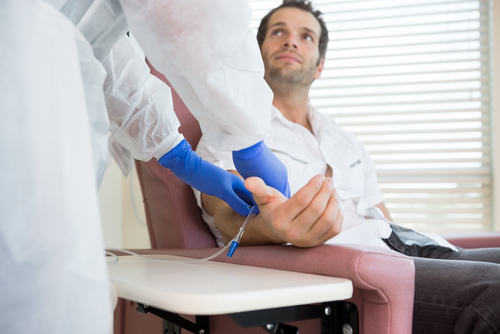According to a new report that appeared August 6th in the journal Blood, ibrutinib sustains benefits in people with relapsed or refractory mantle cell lymphoma. The 26.7 month follow-up of a Phase 2 trial of the medication also showed a manageable safety profile. The study was originally presented during the 56th American Society of Hematology Meeting and Exposition, San Francisco, CA, December 6-9, 2014.
Ibrutinib a small molecule medication also called Imbruvica, acts through the targeting of an enzyme known as a tyrosine kinase. The drug was granted accelerated FDA approval for mantle cell lymphoma based on previous clinical results. “Ibrutinib is the best medicine for mantle cell lymphoma so far. It is now used in almost every patient who has received frontline therapy and has relapsed.” said Michael Wang, MD, in an interview with Oncology Times. Wang was the primary researcher conducting the study, and is a Professor in the Department of Lymphoma/Myeloma at the University of Texas MD Anderson Cancer Center.
Mantle cell lymphoma is an uncommon B-cell non-Hodgkins lymphoma that is most frequently diagnosed in men over the age of 60 and currently has no cure. It is an aggressive form of cancer and is particularly hard to study as there are few cases of this disease. The current results are therefore novel and highly promising.
In this study, participants had a median age of 68 years and were treated with three previous therapies. Eligible participants for the follow-up study had a treatment response or stable form of the cancer. During the median treatment period (roughly 8.3 months), fifty-one of the subjects (46%) were medicated for more than one year and 22 (20%) took ibrutinib for over two years. Drug discontinuation most often occurred due to disease progression (56%), adverse events (11%), withdrawing consent (5%), or physician recommendation (3%).
A total of 67 percent of participants responded to the treatment, with 23 percent showing a complete response. This was a similar response rate to the one observed in the initial study. In the follow-up study, the median response was of 17.5 months, with the median time to a first response of 1.9 months, and the median time to a complete response of 5.5 months.
The response appeared to depend on prior treatments the patients had received. Among 48 people who received prior bortezomib, the overall response rate was of 65 percent, while in 27 people who had received previous lenalidomide treatment, it was of 59 percent. Also, those who had less than two prior treatments had an overall response rate of 82 percent, whereas those with two or more prior treatments had a lower overall response rate of of 63 percent. Tumor size did not affect the overall response rate but did impact complete response, duration of response, as well as overall survival.
Based on these results the investigators concluded that “Ibrutinib demonstrates durable responses and sustained single-agent activity [and] a favorable benefit-risk profile over time, with a manageable safety profile.”


